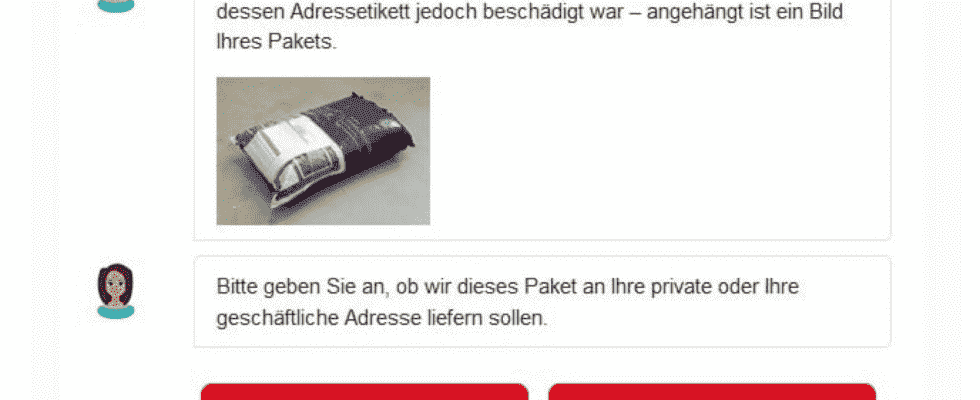Fraudsters are once again acting on behalf of DHL with a phishing scam. This time, a virtual voice assistant is trying to get your data.
Voice assistant Suzy asks for your address in this phishing email. (Source: consumer center)
- Scammers send DHL phishing emails.
- A virtual language assistant wants to elicit personal data from you.
- Don’t fall for the trick and delete the email.
Phishing emails with the subject “? DHL” are currently being sent on behalf of DHL. In these you will be informed that there was a problem with the delivery of your package.
To solve the supposed problem, a virtual language assistant named Suzy welcomes you to the interactive package management system. She first asks for your tracking number and describes the problem. Allegedly, the address label on a package was damaged for you, which is why you should enter your private or business address via an attached link.
If you follow the instructions, you are playing sensitive data into the hands of the fraudsters behind the scam. The content of the email is fictitious. The consumer center points out that the tracking number may match yours, but it is still a fake. Under no circumstances respond to the demands and delete the mail.
Simple signs: This is how you recognize every phishing email
A first indication that you have received a phishing email: the email will ask you to confirm personal data or to enter it on a website. This Under no circumstances should you comply with the request. In addition, criminals often use the official logos of the companies they are copying in their emails, but not official sender addresses.
If you find the sender suspicious, you should read the email twice. You will often find spelling mistakes or inconsistencies in German grammar. The attackers usually do not write their emails themselves, but instead use automatically generated messages or translate known emails with a translation program. But why all the effort?
What do criminals achieve with phishing attacks?
Phishing is used on the Internet to collect real user data. Money can be made with these if e-mail addresses, names and other information are sold for advertising purposes or passed on in criminal forums. With the data obtained, cyber criminals can also address future phishing attacks in a more targeted manner, making their attacks more effective.
Did you receive a suspicious email?
Forward them to [email protected]
or follow us on:
Phishing Checklist
- ✔
Spelling mistake? - ✔
Sensitive data requested? - ✔
Official logos? - ✔
Unknown sender?
Attachments and links contained in malicious e-mails also often inject malware or viruses onto your computer. In addition, you should not simply ignore suspicious emails. Forward them to the above email address and help us report future phishing attacks.
More fraud alerts on netzwelt – stay one step ahead of cybercriminals
But phishing emails are not the only danger lurking on the internet. In addition to fraud attempts, there are all kinds of viruses, Trojans and malware that can infect your computer. Unfortunately, data scandals are also part of everyday digital life. You can see the five most recent articles on the subject of “Scam Alerts” below:
Do you want to stay informed about the latest fraud reports, Subscribe to netzwelt on Twitter, Facebook and Instagram. You can also find all articles on the subject on the next page.
Don’t miss anything with the NETWORK-Newsletter
Every Friday: The most informative and entertaining summary from the world of technology!

Dyson tower fan on sale at Saturn and Media Markt good deal!
